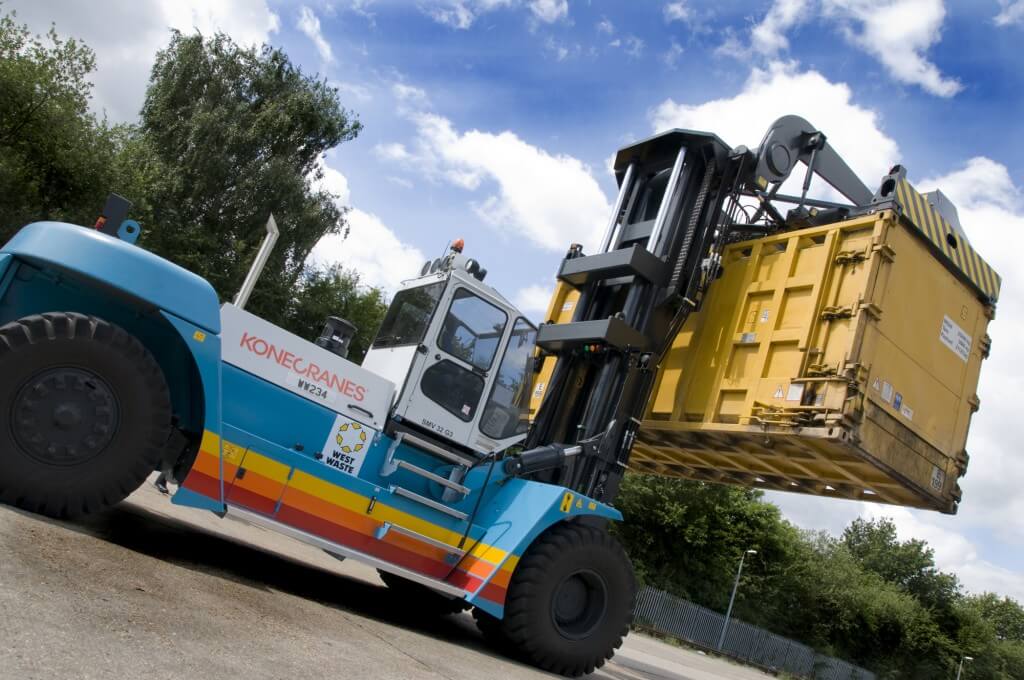When two of London’s busiest waste transfer depots needed a bespoke materials handling solution to accommodate time-critical operations, Cooper SH thought ‘outside-the-box’ and offered an innovative solution. Now the West London Waste Authority (WLWA) has taken delivery of four unique container handlers that have increased productivity and even made operators “fight” over driving them.
Operating out of Brentford and Ruislip, WLWA handles the domestic waste of six London Boroughs; Brent, Ealing, Harrow, Hillingdon, Hounslow and Richmond-upon-Thames. Handling approximately 1000 tonnes of waste out of each site per day, West Waste has just four hours to load and unload all the waste containers onto the trains that service the sites.
Working an intermodal operation, waste is bought in via road, compacted into 20-foot reinforced containers, and then taken out via rail. With the composition of residual waste changing, the site has seen gross payloads increase to a potential 30 tonnes. With the leases on their existing forklifts expiring, West Waste took advantage of this opportunity to seek competitive tenders for replacement machines that could handle this increase.
“We had previously experienced some stability issues with the existing fork trucks, which used an inverted fork from which to suspend the attachment. They had become light on the back axle when fully laden,” says Chris Mayes, Site Manager at WLWA South Ruislip transfer station. “We wanted improved stability and flexibility with the new trucks as well as offering maximum safety and comfort for drivers.”
West Waste faced the challenge of getting FLT’s that could cope with thee 20 per cent extra weight yet have the same dimensions as the old equipment – whilst offering best value for money.
“We didn’t want to oversize the trucks, as we didn’t want to lose manoeuvrability and needed the trucks to fit into our maintenance shed. However, we wanted increased capacity as well as keeping costs down,” continues Chris.
During the competitive tendering process, Cooper SH listened carefully to West Waste’s needs and took their specifications on board. However, Cooper found that using standard forklifts with inverted forks would significantly increase the nominal size of the machines as well as costs.
“We discovered that the extra weight consideration would have forced an increased nominal capacity from 28 tonnes to a 37 tonne machine. This would then have needed an expensive triple mast to accommodate West Waste’s door height restrictions. It was clear we needed to adopt a fresh approach and not get caught in the usual trap of specifying the same type of machine, only bigger”, says David Cooper, Managing Director at Cooper SH.
After extensive research, Cooper SH recommended the use of 32 tonne Konecranes gantry trucks. By using the overhead gantry, the weight of the forks and carriage was eliminated, but more importantly, it reduced the load distance from the front of the tyre to the load centre. This has resulted in a physically smaller machine, one that doesn’t lose capacity in the same manner as it would if forks were employed.
Barry Lister, Senior Assistant Director at WLWA comments: “After evaluating the tenders, Cooper SH appeared to offer the best solution. We sent two of our senior technical staff to Konecranes in Sweden to see if the machines would be suitable for our operation. Impressed with the performance of the trucks, we made the decision to proceed with the tender.”
The machines offer all the standard benefits of Konecranes products such as load sensing hydraulics, low maintenance technology and high visibility mast section; all designed to reduce running costs and increase performance and safety of the trucks.
The specially designed gantry attachments have enabled West Waste to improve precision in the movement of the equipment by having an independent slew and increased side-shift. This has afforded the facility of fine positioning without the need of re-aligning the trucks to the containers; a feature West Waste has become quickly accustomed to.
Chris Mayes adds: “With better visibility through the mast section, lower central gravity and more space in the cab, the new machines have given operators greater confidence in driving and working at full efficiency. In fact, I have had to re-work the rota to fit all operators onto it because they all want to drive the new machines!”
Although the new gantry tucks, which have been in operation since early July, have an increased engine size from nine to 12 litres as a consequence of the increased capacity, the trucks fuel efficient technology has meant that fuel costs have been kept to a minimum in comparison to the previous FLT’s.
Along with fuel savings, Cooper SH provides full engineer back up. Chris Barnes, Sales Manager at Cooper SH explains: “Although West Waste does the service and maintenance of the trucks, our dedicated engineers are always to hand if ever a problem arises that cannot be fixed internally.”
Chris Mayes added: “Cooper SH is a new supplier to us and so far the company has exceeded our expectations with its ability to provide container handling solutions. We are very pleased with the service it provides and we have already established an excellent working relationship.”
West Waste’s contract consists of a total fleet of four 32 tonne Konecranes container handlers, two servicing each site. By working in close partnership, Cooper and WLWA are providing a highly efficient and cost effective operation for waste handling in the London area.
